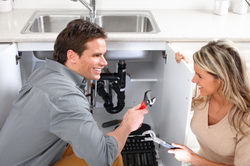Although plumbing used to be a male-dominated field of work, recent studies seem to indicate that women have also taken an interest in it and the jobs in plumbing are no longer exclusively targeting the male population. There are two main motivations why jobs in plumbing have captured the attention of a wider public: the unemployment rates skyrocketing all across the United States and the low stress levels associated with this job.
To put it simply, there is always a need for plumbers regardless of which state you live in, and the work – while not always extremely pleasant – does not come with the same responsibilities as practicing law or medicine, for instance.
The education requirements of a plumber
In order to find well paying jobs in plumbing, the aspirants first need to obtain a high school diploma or have the alternative, a G.E.D., to prove their knowledge. While in high school, courses such as Mathematics or Science (particularly Physics) constitute a great head start. On a side note, certain high school level learning facilities provide students with entry-level vocational courses. Following high school, future plumbers must search for a technical or vocational school to provide them with the more advanced courses, including:
- Pipe fitting knowledge
- The tools and utensils used in plumbing
- Safety considerations for the jobs in plumbing
- Septic system installation and rain water considerations
- Reading and understanding blueprints
- Codes employed in plumbing
Practice period and obtaining a license in plumbing
Hands-on practice can be attained via both union and non-union contractors and are vital in order to obtain the accreditation and obtain well-paid jobs in plumbing. The apprenticeship programs have durations varying between four and five years, but the knowledge gathered is invaluable for any plumber. From being able to identify the fabrics most suitable for a certain pipe fitting to understanding the role of a certain tool, and from applying the procedures learned in the theoretical courses to the four main types of installations; the apprentice will learn them all under the direct supervision of a certified plumber.
Becoming a licensed and bonded plumber
There is no strict standard that applies in the United States, but a plumber is generally allowed to take the examination that would confer him the license to practice without supervision after two to five years. You might be interested to know that the general plumbing license is not always sufficient for individuals who want to find jobs in plumbing that involve working on gas pipelines as additional certification may be required for this type of work. At the same time, attaining certification in energy and water efficiency can present several advantages for a plumber’s career.
Potential jobs in plumbing
These professionals provide installation, repairs and maintenance services not only for pipelines and fittings, but are generally able to offer assistance for appliances and fixtures such as sinks, bathtubs or showers as well. At the same time, malfunctioning waste disposal mechanisms or gas pipes can be listed among the problems that can be solved by a certified plumber.

